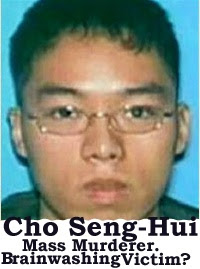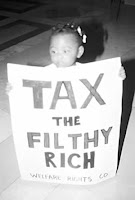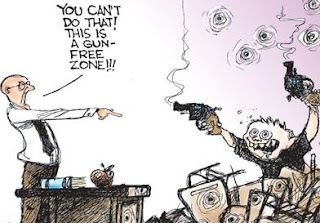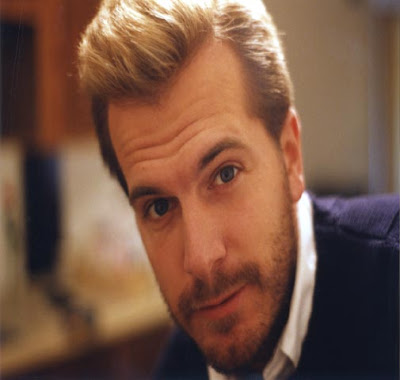All American Tragedy: Otter Made Me Do It
While the consensus about the Virginia Tech massacre has become “blame Charleton Heston,” a better candidate for true responsibility is that immortal icon of college life, Eric Stratton.
The crowd may finally have gotten it right.
This one really is society’s fault.
This monster… we made.
Everyone no
 w knows the story: Cho Seng-Hui, 23 years old, Korean immigrant, English major on the verge of graduation, was a young man getting a higher education for a productive, possibly stellar, life when suddenly something snapped. He went berserk and unleashed a blizzard of bullets on the campus of Virginia Tech, killing 32 people and finally himself.
w knows the story: Cho Seng-Hui, 23 years old, Korean immigrant, English major on the verge of graduation, was a young man getting a higher education for a productive, possibly stellar, life when suddenly something snapped. He went berserk and unleashed a blizzard of bullets on the campus of Virginia Tech, killing 32 people and finally himself.Except that as the whole story came out, it became clear that there was no “snap.” There was, in fact, nothing “sudden” about it.
Cho’s derangement, rage, and twisted worldview were years in the making, faithfully fed, shaped, nurtured and nourished, until it all finally came to full blood-soaked bloom.
So who was feeding, nourishing, training, guiding Cho’s warped psyche?
Not his parents, both of them hard-working immigrants who scraped and saved and struggled for eight years back in South Korea for the privilege of coming to the U.S. to live the American Dream. It was a dream at which they had succeeded at least far enough to send their son to a highly respected American college.
So, in the contemporary tradition of dismissing the madness of the madman and looking instead for “root causes,” let us try to ferret out the roots of Cho’s insanity.
What was his motivation?
Well, Cho left a note in his dorm room, railing against “rich kids” and their “debauchery” and proclaiming “you caused me to do this.”
He also sent a package of pictures, video and a rambling manifesto to NBC (which did precisely as he wanted and obligingly broadcast the rantings of this mass murderer). In it he lauds the Columbine High School killers Dylan Klebold and Eric Harris as martyrs, and condemns his Virginia Tech classmates, saying…
"You had everything you wanted. Your Mercedes wasn't enough, you brats. Your golden necklaces weren't enough, you snobs. Your trust fund wasn't enough. Your vodka and cognac weren't enough. All your debaucheries weren't enough. Those weren't enough to fulfill your hedonistic needs. You had everything,"
Yes, Cho certainly had some issues.
Where in the world could he have gotten this crap?
Where could he possibly?
Why, everywhere, of course.
Anyone who’s been paying attention over the past 4 plus decades should recognize the talking points of his cockamamie diatribe. They are the stuff of a thousand books, movies, sitcoms, talk shows, news reports, political speeches and even school curricula.
For years, one of the few largely unchallenged memes in contemporary U.S. discourse has been the imperative to hate, denigrate and attack America’s achievers.
Tax the rich. Eat the rich. Kill the rich. Spoiled rich kids. The rich get richer. Die yuppie scum.
Sound fa.jpg) miliar?
miliar?
From such cinematic classics as “Citizen Kane” to contemporary drivel like the blockbuster “Titanic” or this year’s “Shooter,” one need only watch a movie long enough to identify the wealthiest character and you know you’ve got your villain.
Political demagogues rant about “two Americas,” one made up of the unjustly poor, regardless of whether they do a single day’s work in their lives, and the other of the unjustly rich, no matter how much blood sweat and effort they pour into making and saving their fortunes. (Perversely enough, this fiction has become a trademark of presidential candidate John Edwards, himself a multimillionaire.)
sweat and effort they pour into making and saving their fortunes. (Perversely enough, this fiction has become a trademark of presidential candidate John Edwards, himself a multimillionaire.)
In press reports, you can always tell an executive is in trouble when a reporter makes a point of mentioning the executive’s six (or heaven forbid seven) figure salary. Surely nobody could be worth that much, no matter how much in profit he brings to his corporate employer or how desperately needed he was when he was hired.
Every instance of Spring Break excess by a couple of college students becomes a global lesson from the media on the decadence of the affluent.
False accusations of rape against three Duke lacrosse players were swallowed hook line and sinker by a demagogic D.A. and national media, because they fit the message.
by a demagogic D.A. and national media, because they fit the message.
Even the private Hilltop Children's Center in Seattle turned its Lego blocks into a lesson in communism and the evils of property ownership… for preschoolers!
The message is loud and clear and Cho was listening.
"You caused me to do this.".jpg)
Clearly he was also buying into our rejection of any personal responsibility or accountability.
Cho was one messed up, angry kid who could have used an unambiguous admonition to snap out of it. A steady message to that effect from the world around him might not have saved him, but it might, maybe, have encouraged him to straighten out. Instead he got a steady exhortation to indulge and wallow in his sickness.
Where could he possibly?

Why, everywhere, of course.
Anyone who’s been paying attention over the past 4 plus decades should recognize the talking points of his cockamamie diatribe. They are the stuff of a thousand books, movies, sitcoms, talk shows, news reports, political speeches and even school curricula.
For years, one of the few largely unchallenged memes in contemporary U.S. discourse has been the imperative to hate, denigrate and attack America’s achievers.
Tax the rich. Eat the rich. Kill the rich. Spoiled rich kids. The rich get richer. Die yuppie scum.
Sound fa
.jpg) miliar?
miliar?From such cinematic classics as “Citizen Kane” to contemporary drivel like the blockbuster “Titanic” or this year’s “Shooter,” one need only watch a movie long enough to identify the wealthiest character and you know you’ve got your villain.
Political demagogues rant about “two Americas,” one made up of the unjustly poor, regardless of whether they do a single day’s work in their lives, and the other of the unjustly rich, no matter how much blood
 sweat and effort they pour into making and saving their fortunes. (Perversely enough, this fiction has become a trademark of presidential candidate John Edwards, himself a multimillionaire.)
sweat and effort they pour into making and saving their fortunes. (Perversely enough, this fiction has become a trademark of presidential candidate John Edwards, himself a multimillionaire.)In press reports, you can always tell an executive is in trouble when a reporter makes a point of mentioning the executive’s six (or heaven forbid seven) figure salary. Surely nobody could be worth that much, no matter how much in profit he brings to his corporate employer or how desperately needed he was when he was hired.
Every instance of Spring Break excess by a couple of college students becomes a global lesson from the media on the decadence of the affluent.
False accusations of rape against three Duke lacrosse players were swallowed hook line and sinker
 by a demagogic D.A. and national media, because they fit the message.
by a demagogic D.A. and national media, because they fit the message.Even the private Hilltop Children's Center in Seattle turned its Lego blocks into a lesson in communism and the evils of property ownership… for preschoolers!
The message is loud and clear and Cho was listening.
"You caused me to do this."
.jpg)
Clearly he was also buying into our rejection of any personal responsibility or accountability.
Cho was one messed up, angry kid who could have used an unambiguous admonition to snap out of it. A steady message to that effect from the world around him might not have saved him, but it might, maybe, have encouraged him to straighten out. Instead he got a steady exhortation to indulge and wallow in his sickness.
Not that there's anything wrong with that, eh?And prepare ye for condemnation anyone who dares “judge” such “divisive” notions as right and wrong, good and evil.
How many execrable “reality” programs feature the “plight” of some deviant nobody demanding, demanding, to be “understood” and “accepted?”
Consider the vermin regularly invited to spew their idiocy for the likes of Maury Povich, Jerry Springer and Oprah Winfrey where their passions, usually anger, are allowed to outweigh their complete worthlessness to stand and speak in any public forum.
In popular entertainment usually aimed at young people… like… Cho Seng-Hui... how often is the childish order “listen to me” turned into sacred writ, without regard for whether the person making the command actually has anything of value to contribute?
How many execrable “reality” programs feature the “plight” of some deviant nobody demanding, demanding, to be “understood” and “accepted?”
Consider the vermin regularly invited to spew their idiocy for the likes of Maury Povich, Jerry Springer and Oprah Winfrey where their passions, usually anger, are allowed to outweigh their complete worthlessness to stand and speak in any public forum.
In popular entertainment usually aimed at young people… like… Cho Seng-Hui... how often is the childish order “listen to me” turned into sacred writ, without regard for whether the person making the command actually has anything of value to contribute?
Not much of a step, then to say "listen to me... or else."
How often does some zero step up to the mike to utter “I just want to say…” and then spew utter nonsense without consequence.
The notion that one may be better served by listening, observing, learning, looking to those who are older, more experienced, better educated or just smarter, never enters into the equation.
The principle of “shut up; suck it up; tough it out; get over it; persevere” has gone by the wayside.
And, in truth, the United States was never big on noblesse oblige.
Popular music is, if anything, worse. Just as a random example, John Cougar Mellencamp once sang:
How often does some zero step up to the mike to utter “I just want to say…” and then spew utter nonsense without consequence.
The notion that one may be better served by listening, observing, learning, looking to those who are older, more experienced, better educated or just smarter, never enters into the equation.
The principle of “shut up; suck it up; tough it out; get over it; persevere” has gone by the wayside.
And, in truth, the United States was never big on noblesse oblige.
Popular music is, if anything, worse. Just as a random example, John Cougar Mellencamp once sang:
“(S)ome people say I'm obnoxious and lazy.
I'm uneducated--my opinion means nothin'
But I know I'm a real good dancer”
A good dancer? Well that changes everything. By all means, share your wisdom.
One of the worst examples of this obsessive narcissism was a treacley load of hooey by Michael Masser and the late Linda Creed titled "The Greatest Love of All". Written in the self absorbed 1970s, it became a number one hit in the self obsessed 1980s for junkie diva Whitney Houston with its stunning assertion:
One of the worst examples of this obsessive narcissism was a treacley load of hooey by Michael Masser and the late Linda Creed titled "The Greatest Love of All". Written in the self absorbed 1970s, it became a number one hit in the self obsessed 1980s for junkie diva Whitney Houston with its stunning assertion:
“The greatest love of all Is easy to achieve.
Learning to love yourself It is the greatest love of all.”
"Learning to love yourself?"
Didn’t some really good guy once say that the greatest love of all was the exact opposite of that, a willingness to lay down your life for a friend?
Nah, better to love yourself so much that you’d destroy the lives of friends, classmates, teachers and strangers alike in order to have your precious say.
Make no mistake. Cho Seng-Hui was troubled from the get-go. His family struggled to build a new life in the U.S. and he had problems from an early age. His grandparents say he seemed disturbed before he left South Korea at the age of 8 and he was later diagnosed as autistic..jpg)
But what kind of advice or guidance did American culture have to offer him?
To subdue his demons and strive to succeed? No.
We did offer the likes of Eric Stratton, a.k.a. “Otter” (Tim Matheson) in the movie “Animal House.” Screenwriter Doug Kenny’s opus is considered a hilarious comedy masterpiece, but its message is a rocket ride down the primrose path. While the movie takes place in the 1960s, it typifies the zealous discarding of values typical during another decade, the 1970s when it was made. In Kenny’s world, the drunken, gluttonous, lecherous, hedonistic, slacker heroes, the Delta Tau Chai frat guys are pitted against straw antagonists easily identifiable as villains because of their affluence, breeding, and advocacy for public order. When justice finally catches up with the Deltas for their long list of crimes, Otter’s response is… let’s go on a destructive rampage!
Nah, better to love yourself so much that you’d destroy the lives of friends, classmates, teachers and strangers alike in order to have your precious say.
Make no mistake. Cho Seng-Hui was troubled from the get-go. His family struggled to build a new life in the U.S. and he had problems from an early age. His grandparents say he seemed disturbed before he left South Korea at the age of 8 and he was later diagnosed as autistic.
.jpg)
But what kind of advice or guidance did American culture have to offer him?
To subdue his demons and strive to succeed? No.
We did offer the likes of Eric Stratton, a.k.a. “Otter” (Tim Matheson) in the movie “Animal House.” Screenwriter Doug Kenny’s opus is considered a hilarious comedy masterpiece, but its message is a rocket ride down the primrose path. While the movie takes place in the 1960s, it typifies the zealous discarding of values typical during another decade, the 1970s when it was made. In Kenny’s world, the drunken, gluttonous, lecherous, hedonistic, slacker heroes, the Delta Tau Chai frat guys are pitted against straw antagonists easily identifiable as villains because of their affluence, breeding, and advocacy for public order. When justice finally catches up with the Deltas for their long list of crimes, Otter’s response is… let’s go on a destructive rampage!
“I think we have to go all out. I think that this situation absolutely requires a really futile and stupid gesture be done on somebody's part.”
Roger that. Cho Seng-Hui out.
And there i.gif) t is. "You caused me to do this."
t is. "You caused me to do this."
Oh sure, there’s a big difference between busting up the homecoming parade with the Deathmobile and murdering one’s classmates but ultimately, the answer to our frustration, Otter/Kenny tells us, is a tantrum. A tantrum will “get” your tormenters and make you immortal, no matter how big a zero you really are.
Such was the wisdom, and lesson, of Dylan Klebold and Eric Harris, whose exercise in mass murder gained them the celebrity of movie stars or pro athletes. Precisely the "stardom" Cho so desired. A pair of maladjusted geeks, Klebold and Harris changed overnight into the guys whose angst everyone wanted to “understand.”
“Understand,” but certainly never “judge.”
Columnist Mel Copen laments the disintegration of any commonly accepted road map for what is acceptable in the terra incognita of today’s morally ambiguous society where just about anything goes.
Anything. Anything at all.
.gif) t is. "You caused me to do this."
t is. "You caused me to do this."Oh sure, there’s a big difference between busting up the homecoming parade with the Deathmobile and murdering one’s classmates but ultimately, the answer to our frustration, Otter/Kenny tells us, is a tantrum. A tantrum will “get” your tormenters and make you immortal, no matter how big a zero you really are.
Such was the wisdom, and lesson, of Dylan Klebold and Eric Harris, whose exercise in mass murder gained them the celebrity of movie stars or pro athletes. Precisely the "stardom" Cho so desired. A pair of maladjusted geeks, Klebold and Harris changed overnight into the guys whose angst everyone wanted to “understand.”
“Understand,” but certainly never “judge.”
Columnist Mel Copen laments the disintegration of any commonly accepted road map for what is acceptable in the terra incognita of today’s morally ambiguous society where just about anything goes.
Anything. Anything at all.
“Today's road map is so fuzzy -- it's difficult to determine truly abhorrent behavior. An obsession with violence? -- how many of our children are hooked on violent video games or go to extremely violent movies? Strange writing? …Stalking… What Cho did understand was that he is now likely to be "immortalized."
And as we push the frontiers and move the lines forward, without the benefit of a map, acceptable norms become fuzzier and fuzzier.”
Oh sure, any sane observer can try raising the alarm about the sick behaviors once condemned everywhere in society and now mutely accepted, even protected. But to do so is to become a pariah, a perpetrator of “judgment.” To try to do so in a venue where it may help confused or disordered young people, while there’s still a chance to do some good, is out of the question.
Given such a pathetic climate, Virginia Governor Tim Kaine will likely get no credit at all for his admirable display of huevos during the hours following the  massacre. The victims weren't even cold when some professional maggots started spouting off political agendas and promoting gun control legislation. Kaine shot such excrement down forcefully, declaring "To those who want to try to make this into some little crusade, I say: Take that elsewhere... People who want to take this within 24 hours of the event and make it their political hobby horse to ride, I've got nothing but loathing for them." In point of fact, guns were already banned on the Tech campus, for all the good it did.
massacre. The victims weren't even cold when some professional maggots started spouting off political agendas and promoting gun control legislation. Kaine shot such excrement down forcefully, declaring "To those who want to try to make this into some little crusade, I say: Take that elsewhere... People who want to take this within 24 hours of the event and make it their political hobby horse to ride, I've got nothing but loathing for them." In point of fact, guns were already banned on the Tech campus, for all the good it did.
In the aftermath of the attack, the expressions of remorse and concern from America’s Korean community have been touching and heartening. It has been a testament to their caring that the Koreans are shocked and horrified the Virginia Tech madman was “one of them.” It’s been understandable that they’re concerned that Cho’s homicidal tantrum reflects badly on them.
They are mistaken on both counts. After fifteen formative years here, Cho was far more one of us than one of them. His depravity was made-in-the-U.S.A. He’d gone from American dream to American psycho just by listening to and following the messages our culture sent, and continues to send, constantly.
 massacre. The victims weren't even cold when some professional maggots started spouting off political agendas and promoting gun control legislation. Kaine shot such excrement down forcefully, declaring "To those who want to try to make this into some little crusade, I say: Take that elsewhere... People who want to take this within 24 hours of the event and make it their political hobby horse to ride, I've got nothing but loathing for them." In point of fact, guns were already banned on the Tech campus, for all the good it did.
massacre. The victims weren't even cold when some professional maggots started spouting off political agendas and promoting gun control legislation. Kaine shot such excrement down forcefully, declaring "To those who want to try to make this into some little crusade, I say: Take that elsewhere... People who want to take this within 24 hours of the event and make it their political hobby horse to ride, I've got nothing but loathing for them." In point of fact, guns were already banned on the Tech campus, for all the good it did.In the aftermath of the attack, the expressions of remorse and concern from America’s Korean community have been touching and heartening. It has been a testament to their caring that the Koreans are shocked and horrified the Virginia Tech madman was “one of them.” It’s been understandable that they’re concerned that Cho’s homicidal tantrum reflects badly on them.
They are mistaken on both counts. After fifteen formative years here, Cho was far more one of us than one of them. His depravity was made-in-the-U.S.A. He’d gone from American dream to American psycho just by listening to and following the messages our culture sent, and continues to send, constantly.

